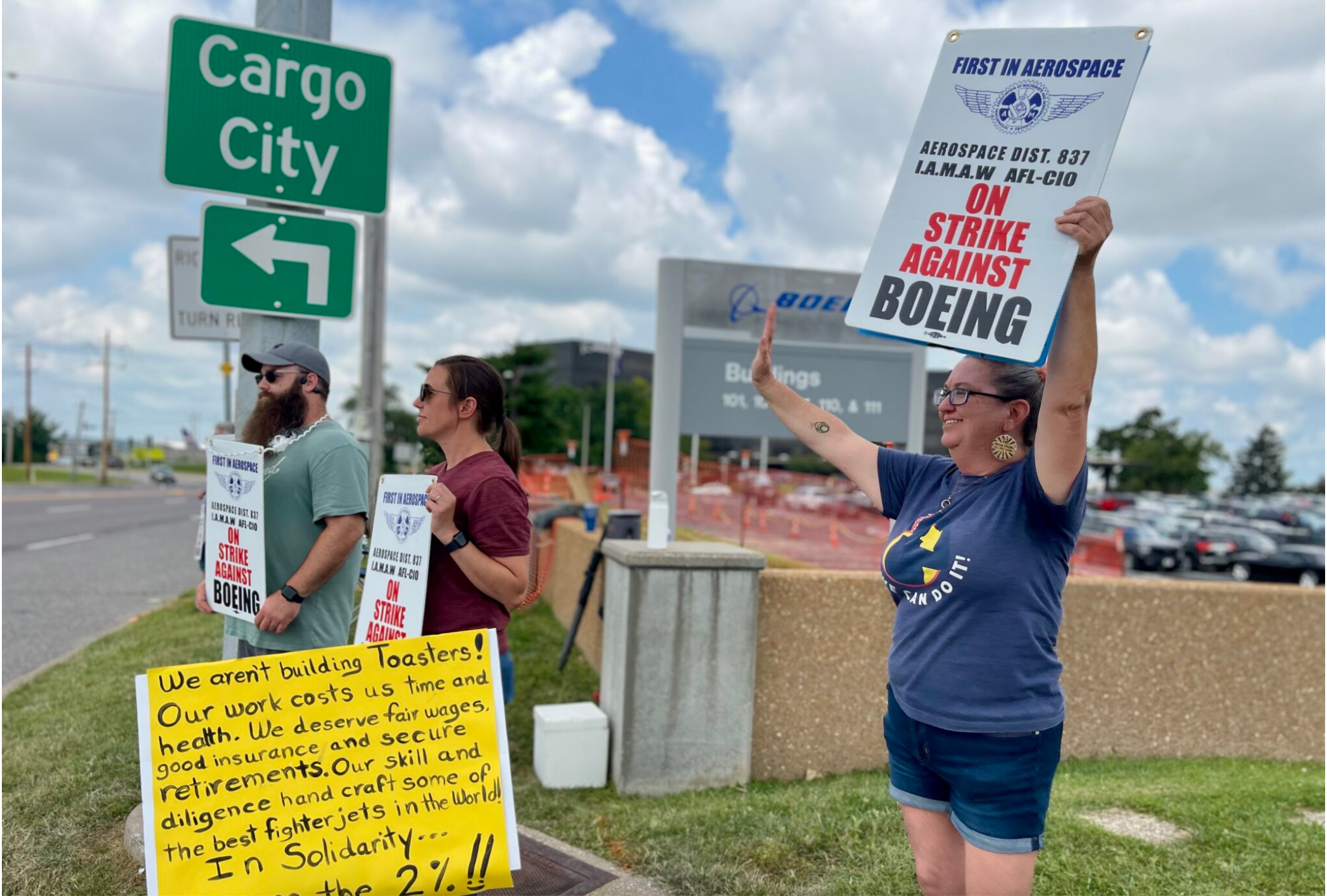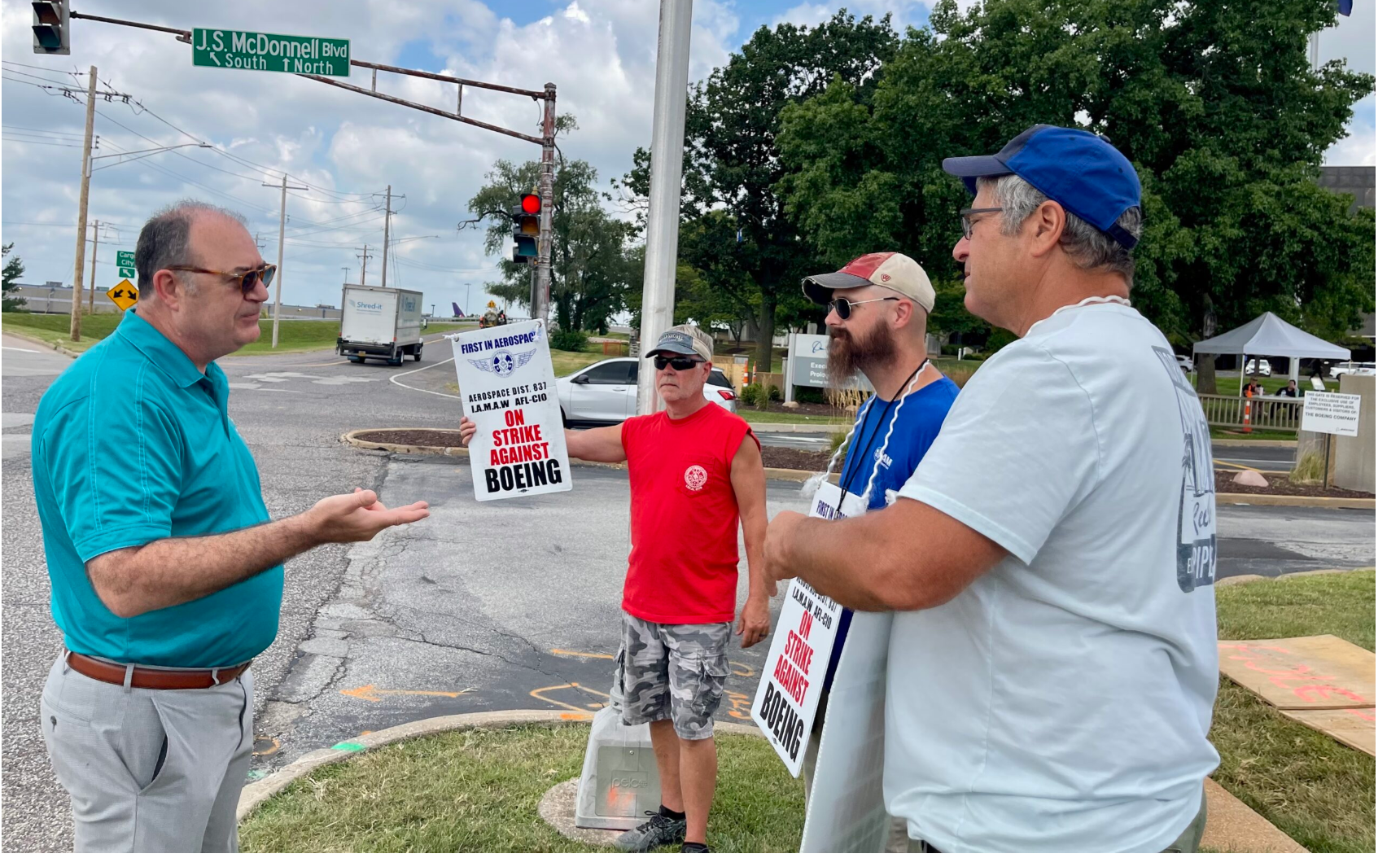
Union leaders say more than 3,000 members went on strike because the agreement offered by the aerospace manufacturing company doesn’t equally benefit all employees
BY: REBECCA RIVAS
Missouri Independent
BERKELEY — Christy Williams stood outside the Boeing facility in St. Louis for hours on Tuesday next to her handwritten sign declaring: “We aren’t building toasters!”
For the last three years, Williams and her son have helped build F-15 fighter jets at Boeing in the St. Louis area — something she called her life’s dream.
“We’re putting our bodies at risk with the physical and strenuous (work), and on top of all the chemicals and other just the dirty air that we’re in there breathing,” said Williams, an assembly mechanic. “We signed on for this because we wanted to build the best fighter jet in the world.”
On Monday, Williams walked out from her job alongside 3,200 workers at Boeing’s three facilities in St. Louis, St. Charles and Mascoutah, Ill., after her fellow members of the International Association of Machinists and Aerospace Workers voted Sunday to reject a four-year labor agreement.
According to a union statement announcing the strike, its members “assemble and maintain advanced aircraft and weapons systems, including the F-15, F/A-18, and cutting-edge missile and defense technologies.”
Chad Stevenson, a plant chairman for the union at the St. Louis facility, said the company’s offer was rejected because it wouldn’t equally benefit the longtime workers who endured pay freezes when the company’s contracts were “lean” over the last several years.
“Our members took concessions to help this company and continued to produce the same amount and the same quality of work,” said Stevenson, who works as an assembly mechanic. “So really it was over eight years, top-scale wasn’t raised. And we’re ready for them to make a competitive, fair offer in these negotiations and take it back before membership and let them decide again.”
The company issued a statement in response to the strike, stating that the employees rejected an offer that “featured 40% average wage growth and resolved their primary issue on alternative work schedules.”
“We are prepared for a strike and have fully implemented our contingency plan to ensure our non-striking workforce can continue supporting our customers,” said Dan Gillian, Boeing Air Dominance vice president, general manager and senior St. Louis site executive.
Williams called the 40% number “a farce” because it was nearly impossible to meet the criteria to earn it.
“If everybody was going to get 40%, we would already be on the floor,” she said. “Just quit playing with the math, give us something fair and let us get back to work.”
The company’s rejected offer included a 20% wage increase over four years and $5,000 ratification bonuses. However, top-scale wage earners wouldn’t see that same increase, Stevenson said.
According to a fact sheet Boeing posted regarding the labor agreement, entry-level workers making $34.25 per hour could potentially go from making $71,240 to $108,222 annually after the four-year contract.
For “max rate” employees, the growth would go from $95,326 to $110,718 after four years, according to a fact sheet.
Stevenson said the numbers on the entry-level fact sheet didn’t add up, and the pay progression to get to top-scale pay is much slower than other Boeing sites and other aerospace manufacturers. He explained that in some cases, it takes 20 years to reach top-scale pay, and union members become “highly skilled and versatile” well before that time. The union is looking to decrease the amount of time, he said, which is called auto progression.
“They act like maybe St Louis is less important, in their opinion,” he said, “but it is just important to this company. It’s their hub for the defense sector, and it’s also a matter of national security. We build the aircraft and munitions that defend this country with several of our products.”

Democratic state Rep. Doug Clemens, who represents a district that partially includes St. Louis Lambert International Airport, visited with the workers on the picket line on Tuesday afternoon.
He told them that his father worked for McDonnell Douglas, which was a major aerospace manufacturing corporation and defense contractor headquartered in St. Louis and was later acquired by Boeing in 1997.
His father retired shortly after Boeing took over, he said, and the first thing the company did was cut health-care benefits to retirees.
“As far as the strike goes, it’s high time to have a strike,” Clemens said. “It’s high time that Boeing is put in its place when it comes to supporting its own workers.”








